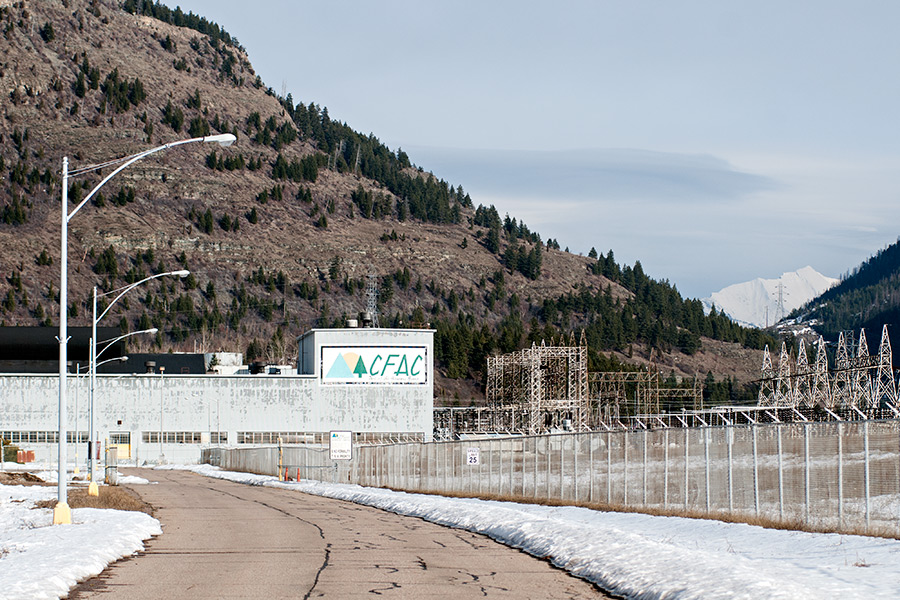The Environmental Protection Agency could approve Superfund cleanup for the Columbia Falls Aluminum Company site as early as this spring or next fall, according to an agency official.
Mike Cirian, an EPA project manager based in Libby, broke the news last week to a group of city and county leaders and residents, many of whom were surprised by the sudden potential action.
Cirian said the shuttered aluminum plant met the requirements to be added to the National Priorities List, which would make it eligible for long-term remedial cleanup under the federal Superfund program. The EPA designates Superfund sites twice a year, in spring and fall.
“March is the first time they can list but it’s looking like listing probably won’t happen until fall,” he said, adding, “none of this is a done deal.”
The potential Superfund listing has become a polarizing topic in a community grappling with how to clean up the 807-acre industrial site that has sat idle for years northeast of town and near the Flathead River. Tests have detected contaminants such as cyanide, fluoride and metals, such as arsenic, chromium, lead, and selenium at the site.
Some attendees at last week’s meeting, including Columbia Falls Mayor Donald Barnhart, expressed dismay at the looming designation and worried about the impacts of the “Superfund stigma” that could hurt the town’s tourism and real estate industries.
City leaders and community members previously pushed for Superfund cleanup, garnering the support of Montana Gov. Steve Bullock and U.S. Sen. Jon Tester. U.S. Sen. Steve Daines has remained neutral, saying he wanted the community to decide. U.S. Rep. Ryan Zinke, a Whitefish native, has opposed the Superfund listing, claiming the projects are never removed from Superfund listing and regularly go over budget. CFAC has also opposed the federal listing, claiming it can complete the cleanup “better and faster,” the company’s project manager John Stroiazzo said.
The EPA received 77 public comments in early 2015 on the proposed listing and a majority expressed support for the Superfund cleanup, according to public records of the submitted comments.
The situation evolved in late November after CFAC’s parent company, Glencore, reached an agreement with the EPA to launch a $4 million remedial investigation into the full scope of contamination. The investigation process is expected to take four to five years, starting with initial surveying in April followed by the drilling of 43 sampling wells from May through September, according to Stroiazzo. Groundwater sampling would begin in fall. EPA officials will provide oversight for CFAC’s investigation, Stroiazzo said.
Cirian praised the agreement as a major step towards cleanup. However, the agreement does not supersede the potential for Superfund listing, he noted. Cirian said Superfund listing could play an important role in the process because it would ensure the cleanup is properly completed.
“When this site is done, it will be cleaner than it is now and that’s what Superfund does,” he said.
Cirian said the agency is also considering an alternative to Superfund cleanup, but that scenario has only happened once before in EPA’s Region 8, which encompasses Montana and five other nearby states.
Some have said the Superfund listing is unnecessary following the CFAC agreement.
“It seemed Superfund was to cover us if working with the company didn’t work out,” Barnhart said.
Phil Mitchell, a first-term Flathead County commissioner, said his government board was opposed to a Superfund listing and that he believes the community as a whole is against the federal cleanup “unless it is absolutely necessary.”
Some community members expressed concern over the negative image of having a local Superfund site, using Libby as a decade-long example. Libby was declared an EPA Superfund site in 2002 due to poisonous asbestos mined near the town that created an environmental disaster that is only now coming to a conclusion.
“If this designation does happen, we need help with how to talk about it so we don’t compound the negativity,” community member Anna Stene said.
Cirian said the “Superfund stigma” does not have to become a reality and that “the community will be better off after (cleanup is) done.”
“Nobody wants the stigma of Superfund but we all want it cleaned up,” local business owner Ray Negron said.
Cirian encouraged community members to pass along written comments to [email protected] or by mail at US EPA Region 8, 108 East Ninth St., Libby, MT 59923.
